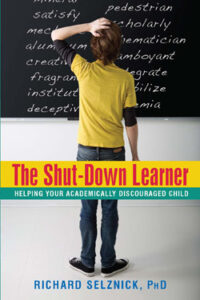 Practically every week I hear an array of concerns regarding distractibility and inattentiveness.
Practically every week I hear an array of concerns regarding distractibility and inattentiveness.
There’s always the question of, “Does my child have ADHD/ADD” lurking.
While talking to parents I try and broaden the narrative, reviewing other factors that may be contributing to why a child is not consistently paying attention.
Before presuming a child has a neurological disorder such as ADHD that is typically diagnosed in the doctor’s office by checking certain items on the Vanderbilt Scales, here are some factors to keep in mind:
- Perhaps the work is too hard. If it is, it will lead to inattention.
- Perhaps the child is playing video games far too late in the evening and not getting enough sleep. In addition, perhaps the child is addicted to video games leaving little in the tank for sustained mental effort (something that I am seeing much more).
- Perhaps there’s been a lot of tension and fighting in the family that is unsettling to the child, which will lead to distractibility.
- Perhaps the teacher is not motivating, which can certainly produce a lot of off-task behavior.
- Perhaps the child has “W.B.D.” (i.e., “Worksheet Burnout Disorder” (a term I made up) and is being flooded by too many worksheets (or its on-line equivalent), leaving the child feeling disconnected and unmotivated.
- Perhaps the child has significant reading problems, making it difficult to pay attention and comprehend. (This is an extremely important consideration.)
- Perhaps there is a lot of distraction in the environment (whether it be the classroom or at home) and the atmosphere does not lend itself to paying attention.
- Perhaps the child is struggling with anxiety and the excessive worrying looks like inattention.
- Perhaps the child is feeling like they may have social issues as they go on TikTok and Instagram and sees friends doing stuff that they weren’t included in.
- Maybe the child has been made fun of or ridiculed, but no one really knows of it other than the child.
Oh, yeah. I almost forgot.
Perhaps the child has ADD/ADHD.
Feel free to make comment below. To receive future blog posts, register your email: https://shutdownlearner.com.
To Contact Dr. Richard Selznick for advice, consultation or other information, email – rselznick615@gmail.com.
 Copyright, Richard Selznick, Ph.D. 2023, www.shutdownlearner.com.
Copyright, Richard Selznick, Ph.D. 2023, www.shutdownlearner.com.

Perhaps the child has an auditory or language processing disorder and therefore doesn’t pay attention to non meaningful information
Thanks for the input, Dr. Melini. Absolutely. Important to keep that in mind.
I bet we could easily come up with another 20 factors contributing to variable attention.
Hope you are well and healthy.
Great list of possibilities, Dr.Selznick!
As a former teacher, I know that anxiety about anything will present like some ADD symptoms and everyone at some time does something ADD-like. I wasn’t diagnosed until age 52! The real deciding factor, as I learned, was do these symptoms happen everywhere, not just at school, not just at home, but at swimming lessons, Boy Scouts, class trips…does it consistently impact negatively no matter the setting.
Thanks for the comment Kathryn. I think that’s an important point to keep in mind. The only pushback I would offer is that parents will say things like, “I don’t get it. The child can pay attention to something for hours if it is something that he likes (e.g., building Legos, playing video games, etc.)
One of the great obstacles in all of education… for each individual student… is the fear of embarrassment. We are all capable of convincing ourselves… with areas where we are weak… that EVERYONE ELSE “gets it” and we don’t… which will often lead to NOT asking for help, or not asking questions in class. A great challenge to teachers is to try to create a safe environment in their classrooms … so that each child feels “protected” in some way. A teacher I knew, once told a “shy” student that each time she asked a question in class, at least half the class was grateful, since they didn’t understand it either!!
Thanks. Yes, I see that fear of embarrassment from grade school through to many of the college students I try and counsel. They choose to hide in the shadows rather than risk exposure. In fact, upon further reflection, it’s an underlying variable throughout our lifespan – the fear of embarrassment and exposure.
OMG! If I see one more “evaluation” written up in an EMR format of course and conducted by a neurodevelopmental pediatrician (and sometimes by a nurse practitioner) with “results” from the Vanderbilt (because it’s free), I am going to lose it!
I’m with you. Thanks.